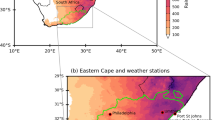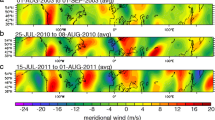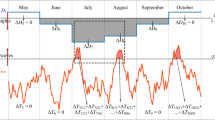Abstract
Warm extreme temperature events or ‘heatwaves’ have disastrous impacts. Several high-impact heatwave events have recently occurred in the Global North, resulting in significant losses of human life and dire effects on economies. The expected increases in the frequency and intensity of extreme heat events under climate change pose a significant threat to South Africa. South Africa, a developing country, with an increasing population, faces many socioeconomic challenges. This study presents the first comprehensive annual and seasonal, spatial and temporal trend analyses of daily maximum and minimum extreme temperature events recorded from 20 meteorological stations across South Africa, spanning 1960–2016. Trend results based on the World Meteorological Organization Expert Team on Climate Change Detection (ETCCDI) and the World Meteorological Organization Commission for Climatology and Indices Expert Team on Sector-Specific Climate Indices (ET-SCI). Indices describing the characteristics of warm extremes are calculated using RClimDex and ClimPACT, respectively. The non-parametric Mann-Kendall test, Spearman rank correlation coefficient and Sen’s slope estimates were used to determine the statistical significance and magnitude of the calculated trend. Results show a general annual trend increase in maximum temperature at a rate of 0.02 °C year−1. The majority of stations reveals statistically significant trends in warm days and nights; with the strongest, general annual trend increases experienced in warm days at a rate of 0.15% year−1. Seasonally, the strongest increases of 0.11% days year−1 in warm days are evident for autumn, while increases of 0.07% days year−1 are calculated for summer. A general increasing trend in heatwave events is recorded at 0.03 events year−1 countrywide.






Similar content being viewed by others
References
Abatan AA, Abiodun BJ, Lawal KA, Gutowski WJ (2016) Trends in extreme temperature over Nigeria from percentile-based threshold indices. Int J Climatol 36:2527–2540. https://doi.org/10.1002/joc.4510
Abbas F, Rehman I, Adrees M, Ibrahim M, Saleem F, Ali S, Rizwan M, Salik MR (2018) Prevailing trends of climate extremes across Indus-Delta of Sindh-Pakistan. Theor Appl Climatol 131:1101–1117. https://doi.org/10.1007/s0070-016-2028-y
Aguilar E, Vincent L, Zhang X (2013) Climate data homogenization theory. Toronto, Canada, Environmental Canada
Alexander LV, Zhang X, Peterson TC, Caesar J, Gleason B, Klein Tank AMG, Haylock M, Collins D, Trewin B, Rahimzadeh F, Tagipour A, Rupa Kumar K, Revadekar J, Griffiths G, Vincent L, Stephenson DB, Burn J, Aguilar E, Brunet M, Taylor M, New M, Zhai P, Rusticucci M, Vazquez-Aguirre JL (2006) Global observed changes in daily climate extremes of temperatures and precipitation J Geophys Res 111. https://doi.org/10.1029/2005JD006290, Global observed changes in daily climate extremes of temperature and precipitation, 111
Alexander L, Herold N (2016) Climpact2 indices and software, the University of South Wales, Sidney, Australia. https://github.com/ARCCSSextremes/climpact2
Allen SMJ, Gough WA, Mohsin T (2015) Changes in the frequency of extreme temperature records for Toronto, Ontario, Canada. Theor Appl Climatol 119:481–491. https://doi.org/10.1007/s00704-014-1131-1
Angélil O, Stone D, Wehner M, Paciorek CJ, Krishnan H, Collins W (2017) An independent assessment of anthropogenic attribution statements for recent extreme temperature and rainfall events. Am Meteorol Soc 30:5-16. 101175/JCLI-D-16-0077.1
Araujo JA, Abiodun BJ, Crespo O (2016) Impacts of drought on grape yields in Western Cape, South Africa. Theor Appl Climatol 123:117–130. https://doi.org/10.1007/s00704-014-1336-3
Baudoin MA, Vogel C, Nortje K, Naik M (2017) Living with drought in South Africa: lessons learnt from the recent El Niño drought period. Int J Disaster Risk Reduct 23:128–137. https://doi.org/10.1016/j.ijdrr.2017.05.005
Caloiero T, Coscarelli R, Ferrari E, Sirangelo B (2017) Trend analysis of monthly mean values and extreme indices of daily temperature in a region of southern Italy. Int J Climatol 37:284–297. https://doi.org/10.1002/joc.5003
Davis-Reddy CL, Vincent K (2017) Climate risk and vulnerability: a handbook for southern Africa, 2nd edn. CSIR. Pretoria, South Africa
Di Napoli C, Pappenberger F, Cloke HL (2018) Assessing heat-related health risk in Europe via the universal thermal climate index (UTCI). Int J Biometeorol 62(7):1155–1165. https://doi.org/10.1007/s00484-018-1518-2
Engelbrecht F, Landman W (2010) South Africa’s present-day climate. In: Southern Africa risk and vulnerability atlas. CPD Print, Pretoria, pp 2–5
Ebbs S (2020) Climate change can ‘supercharge’ wildfires in Australia through more extreme heat, drought. abcNews. https://abcnews.go.com/International/climate-change-supercharge-wildfires-australia-extreme-heat-drought/story?id=68096029.
Fischer EM, Shär S (2010) Consistent geographical patterns in high-impact European heatwaves. Nat Geosci 3:398–403. https://doi.org/10.1038/ngeo866
Fitchett JM, Grab SW, Portwig H (2019) Progressive delays in the timing of sardine migration in the Southwest Indian Ocean. S Afr J Sci. 2019 115(7/8):1-6. https://doi.org/10.17159/sajs.2019/5887
Founda D, Pierros F, Katavoutas G, Keramitsoglou I (2019) Observed trends in thermal stress at European cities with different background climates. Atmos 10(8):436. https://doi.org/10.3390/atmos10080436
Grab SW, Knight J (2018) Southern African montane environments. In: Holmes PJ, Boardman J (eds) Southern African landscape and environmental change. Routledge, Oxon
Head T (2019) Seven South African weather records that were broken in 2019. The South African. https://www.thesouthafrican.com/news/weather/hottest-day-in-south-africa-ever-weather-records/. Accessed 26 February 2020
Karki R, Hasson SU, Gerlitz L, Talchabhadel R, Schickhoff U, Scholten T, Bӧhner J (2019). Rising mean and extreme near-surface air temperature across Nepal. Int J Climatol 40(4):2445-2463. 1-19. https://doi.org/10.1002/joc.6344
Klein Tank AMG, Zwiers FW, Zhang X (2009) Guidelines on analysis of extremes in a changing climate in support of informed decisions for adaptation (WCDMP no. 72, WMO-TD no. 1500). Switzerland: World Meteorological Organization, 54 pp.
Kruger AC, Sekele SS (2013) Trend in extreme temperature indices in South Africa: 1962-2009. Int J Climatol 33:661–676. https://doi.org/10.1002/joc.3455
Kruger AC, Nxumalo M (2017) Surface temperature trends from homogenized time series in South Africa: 1931-2015. Int J Climatol 37:2364–2377. https://doi.org/10.1002/joc.4851
Kruger AC, Rautenbach H, Mbatha S, Ngwenya S, Makgola TE (2019) Historical and projected trends in near surface temperature indices for 22 locations in South Africa. S Afr J Sci. 115(5/6). https://doi.org/10.17159/sajs.2019/4846
Landman WA, Malherbe J, Engelbrecht F, (2017) South Africa’s present-day climate. In Mambo J, Faccer K, (eds). Understanding the social and environmental implication of global change, African Sun Media: Stellenbosch
Lee WV (2014) Historical global analysis of occurrences and human casualty of extreme temperature events (ETEs). Nat Hazards 70:1453–1505. https://doi.org/10.1007/s11069-0.13-0884-7
Lennard C (2019) Multi-scale drivers of the south African weather and climate. In: Knight J, Rogerson CM (eds) The geography of South Africa. Springer, Switzerland
MacKellar N, New M, Jack C (2014) Observed and modelled trends in rainfall and temperature for South Africa: 1960-2010. S Afr J Sci 110(7/8):51–63. https://doi.org/10.1590/sajs.2014/20130353
Malherbe J, Smit IPJ, Wessels KJ, Beukes PJ (2020) Recent droughts in the Kruger National Park as reflected in the extreme climate index. Afr J Ran For Sci 37(1):1–17. https://doi.org/10.2989/10220119.2020.1718755
Mangani R, Tesfamariam E, Bellocchi G, Hassen A (2018) Modelled impacts of extreme heat and drought on maize yield in South Africa. Crop Pas Sci 69:703–716. https://doi.org/10.1071/CP18117
Nairn JR, Fawcett RJB (2015) The excess heat factor: a metric for heatwave intensity and its use in classifying heatwave severity. Int J Environ Res Public Health 12:227–253. https://doi.org/10.3390/ijerph120100227
Nana M, Coetzer K, Vogel C (2019) Facing the heat: initial probing of the city of Johannesburg’s heat-health planning. S Afr Geogr J 101(2): 253–268. 1080/03736245.2019.1599412
Nemec J, Bruder C, Chimani B, Auer I (2013) Trends in extreme temperature indices in Austria based on a new homogenized dataset. Int J Climatol 33:1538–1550. https://doi.org/10.1002/joc.3532
Ngwenya B, Oosthuizen J, Cross M, Frimpong K, Chaibva CN (2018) A review of heat stress policies in the context of climate change and its impacts on outdoor workers: evidence from Zimbabwe. Int J Soc Ecol Sustain Dev 9(1):1–11. https://doi.org/10.4018/IJSESD.2018010101
Noome K, Fitchett J (2019) An assessment of the climate suitability of Afriski Mountain Resort for outdoor tourism using the tourism climate index (TCI). J Mount Sci 16(11):2453–2469
Osborne S (2019) France’s summer heatwave killed 1,500 people, health minister announces. Independent. https://www.independent.co.uk/news/world/europe/france-heatwave-summer-dead-death-toll-europe-a9096806.html.
Panda K, Mishra A, Kumar A, Mandal KG, Thakur AK, Srivastava RC (2014) Spatiotemporal patterns in the mean and extreme temperature indices of India, 1971-2005. Int J Climatol 34:3585–3603. https://doi.org/10.1002/joc.3931
Pasquini L, Cowling RM, Ziervogel G (2013) Facing the heat: barriers to mainstreaming climate change adaption in local government in the Western Cape Province, South Africa. Habitat Int 40:225–232. https://doi.org/10.1016/j.habitatint.2013.05.003
Perkins SE, Alexander LV, Nairn JR (2012) Increasing frequency, intensity and duration of observed global heatwaves and warm spells. Geophys Res Lett 39. https://doi.org/10.1029/2012GL053361
Perkins SE (2015) A review on the scientific understanding of heatwaves-their measurement, driving mechanisms, and changes at the global scale. Atmos Res 164-165:242–267. https://doi.org/10.1016/j.atmosres.2015.05.014
Perkins-Kirkpatrick SE, Gibson PB (2017) Changes in regional heatwave characteristics as a function of increasing global temperature. Sci Rep 7:12256. https://doi.org/10.1038/s41598-017-12520-2
Perkins-Kirkpatrick SE, Fischer EM, Angélil O, Gibson PB (2017) The influence of internal climate variability on heatwave frequency trends. Environ Res Lett 12. https://doi.org/10.1088/1748-9326/aa63fe
Ragone F, Wouters J, Bouchet F (2018) Computation of extreme heatwaves in climate models using a large deviation algorithm. Proc Natl Acad Sci U S A 115:24–29
Salameh AAM, Gámiz-Fortis SR, Castro-Díez Y, Hammad AA, Esteban-Parra MJ (2018) Spatial-temporal analysis for extreme temperature indices over the Levant region. Int J Climatol 39:5556–5582. https://doi.org/10.1002/joc.6171
Simmonds I (2018) What causes extreme hot days in Europe. Environ Res Let 13. https://doi.org/10.1088/1748-9326/aacc78
SAWS (2020) Weather questions. [available online at https://www.weathersa.co.za/home/weatherques.]
Tabari H, Talaee PH (2011) Temporal variability of precipitation over Iran: 1966-2005. J Hydrol 396(3):313–320
Thorton PK, Ericksen PJ, Herrero M, Challinor AJ (2014) Climate variability and vulnerability to climate change: a review. Glob Chan Bio 20:3313–3328. https://doi.org/10.1111/gcb.12581
Tyson PD, Preston-Whyte RA (2000) The atmosphere and weather of southern Africa. 2nd Ed. Cape Town: Oxford University Press Southern Africa. https://doi.org/10.1002/joc.725, The weather and climate of southern Africa by P. D. Tyson and R. A. Preston-Whyte. Oxford University Press Southern Africa, Cape Town, 2000. No. of pages: xii + 396. Price £32.50. ISBN 0-19-571806-2 (paperback)
Van der Walt AJ, Fitchett JM (2020) Statistical classification of south African seasonal divisions on the basis of daily temperature data. S Afr J Sci 116(9/10):1-15. 10.17159/ sajs.2020/7614
Van Wilgen NJ, Goodal V, Holness S, Chown SL, McGeoch MA (2016) Rising temperatures and changing rainfall patterns in South Africa’s national parks. Int J Climatol 36:706–721. https://doi.org/10.1002/joc.4377
Vincent LA, Zhang X, Bonsl BR, Hogg WD (2002) Homogenization of daily temperatures over Canada. J Clim 15:1322–1334
Vincent LA, Wang XL, Milewska EJ, Wan H, Feng Y, Swail V (2012) A second generation of homogenized Canadian monthly surface air temperature of climate trend analysis J Geophys Res 117. https://doi.org/10.1029/2012JD017859, A second generation of homogenized Canadian monthly surface air temperature for climate trend analysis, 117
Wang XL (2008a) Accounting for autocorrelation in detecting mean shifts in climate data series using penalized maximal t and F test. J Appl Meteorol Climatol 47:2423–2444
Wang XL (2008b) Penalized maximal F-test for detecting undocumented mean-shifts without trend-change. J Atmos Ocean Technol 25(3):368–384. https://doi.org/10.1175/2008/JTECHA982.1
Wang XL, Feng Y (2013) RHtestsV4 user manual. Climate research division, atmospheric Science and Technology Directorate, science and technology branch, Environment Canada, 28pp. [available online at https://github.com/ECCC-CDAS/RHtests/blob/master/V4_files/RHtestsV4_UserManual_10Dec2014.pdf]
Yosef Y, Aguilar E, Alpert P (2019) Changes in extreme temperature and precipitation indices: using an innovative daily homogenized database in Israel. Int J Climatol 39:5022–5045
Zhang Y, Yang F (2004) RClimDex (1.0): Manual. Environmental Canada: Ontario, Canada
Zhang X, Feng Y, Chan R, (2018) Introduction to RClimDex v1.9, climate research division, Environment Canada, Downsview, Ontario, Available from https://github.com/ECCC-CDAS/
Ziervogel G, New M, Archer van Garderen E, Midgley G, Taylor A, Hamann R, Stuat-Hill S, Myers J, Warbuton M (2014) Climate change impacts and adaption in South Africa. Wiley Interdiscip Rev Clim Chang 5:605–620. https://doi.org/10.1002/wcc.295
Acknowledgements
We acknowledge the financial and collegial support offered to Adriaan J van der Walt from the Faculty of the Natural and Agricultural Sciences and the Geography Department at the University of the Free State. Jenner M Fitchett received funding from the DST-NRF Centre of Excellence for Palaeoscience. The authors thank Professor Christopher Curtis for suggestions and advice on earlier stages of the project. The authors would also like to thank Yang Feng for assistance with the download and usage of RClimDex and RHtestV4 software.
Funding
JF receives operational support funding from the DSI-NRF Centre of Excellence for Palaeosciences.
Author information
Authors and Affiliations
Contributions
JF conceptualized and lead the project and was the principal supervisor. AvdW collected, curated and analysed the data and wrote the first draft. AvdW and JF developed the methodology, conducted the validation and wrote and revised the manuscript.
Corresponding author
Ethics declarations
Conflict of interests
The authors declare that they have no conflict of interest.
Additional information
Publisher’s note
Springer Nature remains neutral with regard to jurisdictional claims in published maps and institutional affiliations.
Rights and permissions
About this article
Cite this article
van der Walt, A.J., Fitchett, J.M. Exploring extreme warm temperature trends in South Africa: 1960–2016. Theor Appl Climatol 143, 1341–1360 (2021). https://doi.org/10.1007/s00704-020-03479-8
Received:
Accepted:
Published:
Issue Date:
DOI: https://doi.org/10.1007/s00704-020-03479-8




